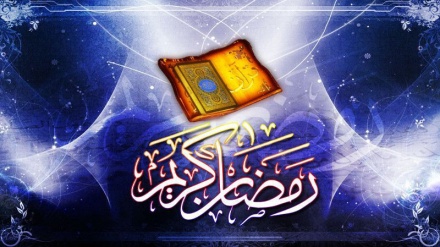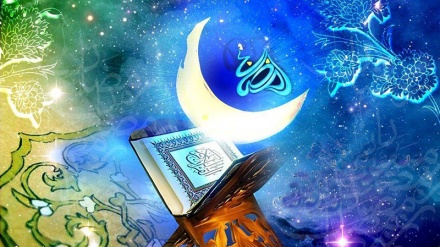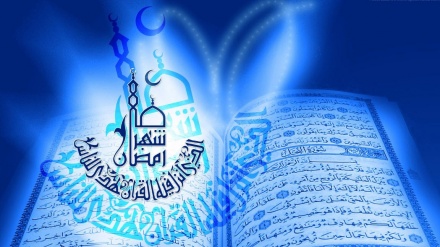Blessed Month of Ramadhan
Welcome to the 3rd episode of the series “Blessed Month of Ramadhan”. The month of fasting is the month of better and more efficient servitude of God, Who out of His Infinite Compassion opens for us the floodgates of Divine Mercy, so that we review our affairs, repent of our past misdeeds, reform ourselves and return to the path of our Loving Creator.
God points out that the reason behind the virtue of blessed Ramadhan is the revelation in this month of Holy Qur’an, the Final Heavenly Scripture with the universal message of Islam, to His Last and Greatest Messenger, Prophet Mohammad (blessings of God upon him and his progeny). Thereafter, God elaborates on a number of prominent features of Holy Qur’an, noting that the Holy Qur’an guides all mankind and enables us to distinguish righteousness from falsehood for our own salvation. In the spiritual atmosphere of the blessed month of Ramadhan, every believer tries to find an avenue for further proximity to God. Upon wishing the best for those who fast in the blessed month of Ramadhan, we begin today’s program with a remarkable prayer of the Prophet’s 4th Infallible Heir, Imam Zain al-Abedin (AS): We are grateful to God for granting us the religion of Islam and for placing us on His righteous path. May God bless Mohammad and his Infallible Progeny, and inspire us to understand the virtues of this month; to honour this month; and to avoid whatever has been prohibited in this month. O God Almighty we plead to You to fill the month of Ramadan with our prayers, and to assist us to fast throughout its days and to pray and worship You; throughout its nights.
In the blessed month of Ramadhan, a special atmosphere is shaped in Iranian cities and villages. People of Iran welcome this blessed month and prepare their needed provisions, a few days prior to the start of Ramadhan, in addition to cleaning their homes and mosques. In this month, spiritual gatherings for recitation of the Holy Qur’an are convened in the presence of enthusiastic youths. These meetings and gatherings are held in mosques and religious sites with extraordinary fervor and enthusiasm. In these meetings, exegesis of Holy Qur’an and presentation of ethical, educational, and social topics are presented by religious scholars and experts. Furthermore, the gatherings of those who fast, at mosques and religious sites, raise an appropriate opportunity for them to contribute to good deeds, to think of upgrading the society, and to assist the poor and needy. Factories, offices, and organizations make a number of changes in their working hours and render a number of facilities to their personnel in this blessed month of fasting. The tradition of rendering Iftar or food for breaking the day’s fast at sunset to people of Iran is common, similar to other Islamic countries. Meeting friends and relatives at the time of Iftar and/or thereafter is a usual tradition among Iranian families. The adolescents who fast for the first time in this holy month, receive gifts as encouragement to fast and to have good memories of this blessed month. Throughout these days, traditional cookies are also served. Each of the Iranian cities have their own special traditions in Ramadhan. Special takeaway meals are served. In the late midnight hours, before dawn, Muslim families eat Sahari in a friendly and kind atmosphere, and upon the Azaan or the Call for the Dawn Prayer, they perform ablution and observe the ritual prayer. Many go to mosques to participate in the congregational prayer. May God grant us the privilege to enthusiastically join the friendly gathering of those who fast in blessed Ramadhan, and to make the best of this unique month!
Ayah 185 f Surat-al-Baqarah of the Holy Qur’an says: “The month of Ramadhan is one in which the Qur’an was sent down as guidance to mankind, with manifest proofs of guidance and the criterion. So let those of you who witness it fast in it, and for someone who is sick or on a journey, let it be a similar number of other days. Allah desires ease for you, and He does not desire hardship for you, and so that you may complete the number, and magnify Allah for guiding you, and that you may give thanks.”
In this ayah, God Almighty, after stating the philosophy behind fasting and pointing out that fasting is observed for a number of known days, notes that those known days are within the blessed month of Ramadhan. Ramadhan is superior to other months.
This ayah also refers to the ease of Islamic instructions. It notes that someone who is sick or on a journey should not fast, but should compensate for it for a similar number of other days. Furthermore, someone who has faith in God should thank the Loving Creator and glorify Him for providing guidance to the righteous path. The Iranian mystic, Khwajah Abdullah Ansari, who flourished a thousand years ago, has said: The Blessed month of Ramadhan come to wash away the sins of sinners with repentance; so be grateful for this divine blessing as the divine religion of Islam which is superior to all other creeds has the Holy Qur’an, which is more valuable than other books, and which God bestowed to His Last and Greatest Prophet in this month.
As the Prophet has said in his famous sermon on the advent of this month, Ramadhan is the most honorable month, and in this month, God forgives the sins of those who repent and shuts the doors of hell.
Dear listeners, let’s pay attention to recommendations for maintenance of health in the blessed month of Ramadhan. Yesterday, we pointed that patients and incapable individuals have been exempted from fasting. Meanwhile, as per this divine instruction, some refrain from fasting with the slightest discomfort, while God Almighty in Surat-al-Baqarah points out that He wants our ease and has paid attention to the innate nature of mankind, instructing mankind to fast, on this basis. Thus, God reminds us that fasting is better for us; should we know.
Today, it has been shown that fasting brings about appropriate hygienic results; and those who fast, benefit physically and spiritually from this virtuous act of Islamic worship. Based on scientific findings; fasting leads to control, and even treatment of ailments.
According to the American physician, Dr. Carlo, “any patient should avoid food for a set period of time, because as long as you eat, microbes continue to grow. However, when you avoid food, microbes are weakened. The fasting that Islam has emphasized is the main guarantor of health.”
Based on the science of medicine; fasting leads to physical health and washes up the body, especially the digestion system, creating physical freshness.
Iranian Nutritionist, Dr. Zahra Abdullahi, points out that based on several studies, fasting plays a decisive role in recovery from many illnesses. In most ailments that are caused by inappropriate eating habits, such as obesity, and weight gain, its fasting grants beneficial results. Based on studies, which have been carried out, fasting is highly beneficial with those, who have high levels of blood cholesterol. According to this nutritionist, the digestion system remains empty for a few hours within the fasting period. In other words, the digestion system and other parts of the body which are involved in digestion and absorption of food, rest in the fasting period, enabling them to maintain a better conduct after the individual breaks his fast.
The other point of importance is that those who fast; lower consumption of salt due to thirst. Thus, we witness appropriate consumption of sodium, resulting in a lower number of cases of hypertension. If individuals do not start to excessively consume salt after this month, they will not face an intense surge in blood pressure.
Adoption of an appropriate diet in the blessed month of Ramadhan is of significant importance so that one would be able to avoid unhealthy eating habits, and to benefit from the spiritual blessings of this blessed month of fasting.
Goodbye and God bless you until we meet again tomorrow with another interesting edition of our Ramadhan Special.
AS/SS


